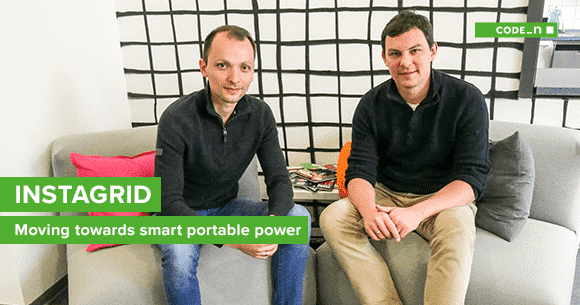From a corporate world to an entrepreneurial life – co-founders of instagrid reimagine the future of electrical power
With a strong background in the field of electronics and battery development, Andreas Sedlmayr and Sebastian Berning decided to take a chance on their business idea and jump-start their own company. Always hungry for innovation and with a passion to author and own projects, they recently left the relative safety and comfort of a corporate gig for the freedom and exhilaration of a startup. They are now eager to thrive in the entrepreneurial world and are working towards a viable mobile supply of electrical power. The team recently moved into the CODE_n SPACES, the right place to further develop their business model, speed up the time to market and connect with like-minded peers. The CODE_n team wishes Andreas and Sebastian a warm welcome and is excited to accompany them on their entrepreneurial journey.

Lisa: Hi Andreas, hi Sebastian, you joined us as a new startup in CODE_n SPACES at the beginning of February. Again, I’d like to wish you a warm welcome.
instagrid – so what’s it all about? Maybe you could remind our readers what exactly your startup is going for.
instagrid: instagrid is taking mobile energy provision into the 21st century. What we mean specifically by that is we’re developing portable battery storage units to supply electricity to professional users – a kind of mobile power socket. Our aim is to tap into a series of technical innovations and take what in principle’s a pretty obvious idea and make a big thing out of it. But we’ll also be exploring new territory when it comes to the business model.
Lisa: So what’s your background, and where did the insight come from that the area of portable energy supplies offers a genuine gap in the market?
instagrid: We previously worked together for a number of years at a well-known company in the area, where we headed up battery and electronics development for professional rechargeable tools. Before that, we had already worked on traction batteries for electric vehicles and on big stationary energy storage systems, the kinds they use to stabilize public electricity grids. We also worked together closely with colleagues in the e-bike and rechargeable vacuum cleaner departments. When you’ve worked this long in the field of batteries, at some point you start to work out that sooner or later everything will run on batteries – it’s just about unavoidable. We like to say that “the battery is eating the world,” a bit like the famous statement Marc Andreessen made about software. When you think it through to a logical conclusion, you start to spot lots of areas where supplying battery power makes sense. We’re particularly thinking about professional applications, although sometimes it’s enough to just peel your eyes and walk downtown. You start to notice how difficult it is these days shifting around heavy diesel generators and never-ending cable extensions!
Lisa: You were both still working on a fixed contract for a big company until recently. What does it feel like going 100% along the entrepreneurship track?
instagrid: Fabulous! We’ve been itching to get to this point for a long time and now it’s just fun being able to completely go for it. The step itself wasn’t difficult for us, it was more like a logical consequence because we were 100% convinced of our idea. And anyway, we’ve had this idea about starting our own thing for a long time. So we were both just waiting for the right moment. But the idea, the people in the team, and the situation at home also play a big role before you really decide to make the leap.
Lisa: What motivated you to join us at CODE_n SPACES to push ahead with your startup?
instagrid: CODE_n SPACES offers everything we need to quickly move forward as a new startup. Aside from the rooms and the infrastructure, the contacts to investors, customers, and regional networks are really important to us. For example, lots of the issues we’re having to deal with as new entrepreneurs can be worked out quickly by talking to the other residents in the building. Also, whenever they can, the CODE_n people give us quick help, without any of the red tape – a big thank-you for that!
Lisa: When do you currently plan to launch the first portable generator and which sectors of industry will you be targeting?
instagrid: We’re planning an “early access program” so we can already start supplying equipment to our pilot customers in the second half of 2018. We’re mainly concentrating on the sectors where we already perceive a strong demand and think it’s going unanswered, such as event technology and catering. These days we can use so-called rapid prototyping to ensure products get to the customer good and early and are nearly ready for serial production. At the same time, we get continuous feedback to go into development.
Lisa: Do you have competitors? Are there actually comparable products on the market?
instagrid: As far as we’re concerned, there are lots of good ideas on the market but no real product that was systematically developed to match the needs of professional users. Of course we’re competing with conventional gas and diesel generators, which make up a multi-billion euro market, but in times of fine particulate pollution and given the growing trend toward electric vehicles, it’s difficult to imagine any technology over 100 years old with much of a future.
Lisa: What are your plans for 2018?
instagrid: There are about a thousand things to get on with in 2018, but that’s what’s good about it. Aside from product development, funding is obviously a big priority. We’ll also be pulling together the rest of the core team and solidifying the company culture and brand identity. It’s important to us to capture the sense of ambition you have at the beginning so we don’t lose touch with it on the long journey ahead.
Lisa: Thanks for this interview. We’ll report back soon on your new activities but for now, we’d like to wish you lots of luck with the development of your product.





Write a comment